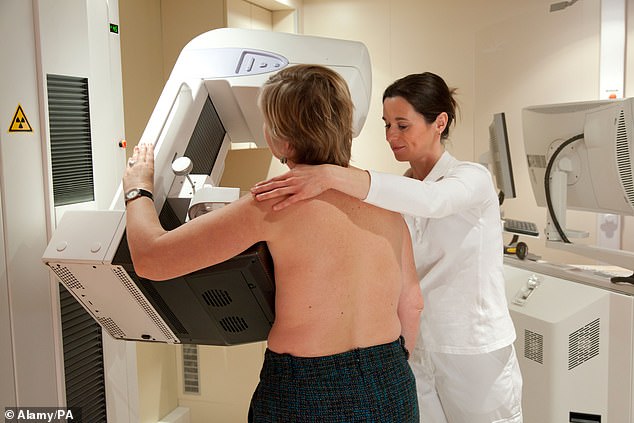Scottish scientists believe an essential mineral in Brazil nuts could help find new treatments to prevent breast cancer from spreading through the body.
Selenium, found in nuts, meats and grains, is an essential nutrient for human health.
But scientists have found that it also causes a certain type of breast cancer to spread to other parts of the body, where it can become useless.
The research was funded by Cancer Research UK.
About 4,900 women in Scotland are diagnosed with breast cancer every year and around 15 percent have triple negative breast cancer, a type that does not respond to hormone therapy.
Selenium, a mineral found in Brazil nuts, could help find new treatments to prevent breast cancer from spreading through the body (file photo)


A woman getting a mammography in a clinic. Around 4,900 women in Scotland are diagnosed with breast cancer every year and around 15 per cent have triple negative breast cancer


American actress Angelina Jolie (pictured) underwent a double mastectomy in 2013 to reduce her risk of developing breast cancer
It can be more difficult to treat but is often manageable through therapy and surgery unless it spreads.
Selenium is an antioxidant that helps protect the body against disease and cancer.
But scientists at the Cancer Research UK Scotland Institute in Glasgow discovered that cancer cells need selenium, and when they move to other parts of the body they cannot survive without it.
The research team found that a selenium deficiency could kill these cells, especially those in the blood circulation that are trying to spread to the lungs.
Research leader Dr. Saverio Tardito said: ‘We need selenium to survive, so removing it from our diets is not an option. But if we can find a treatment that disrupts the uptake of this mineral by triple negative breast cancer cells, we may be able to prevent this cancer from spreading to other parts of the body.
‘Usually it is not the breast cancer itself that proves fatal, as it can often be successfully tackled with treatment or surgery. It is only when the cancer spreads that it becomes more difficult to control.
‘With triple-negative breast cancer having fewer treatments to control the disease, finding a new way to prevent its spread could be lifesaving.’
Triple negative breast cancer can be caused by an error in the BRCA genes, which increases the chance of developing certain types of cancer, including breast cancer.
About 70 percent of women with defective BRCA1 or BRCA2 genes will develop breast cancer by age 80.
American actress Angelina Jolie has the defective gene and underwent a double mastectomy in 2013 to reduce her risk of developing breast cancer.
Cancer Research UK Science Engagement Lead, Dr Sam Godfrey, said: ‘Outcomes for patients with triple negative breast cancer may be worse than for other types of cancer. Research like this could be the key to preventing the spread of this cancer, which would have a transformative effect on the way this disease is treated.”
Lisa Bancroft, from Dunfermline, Fife, who discovered she had the BRCA mutation at the age of 27, welcomed the research.
She underwent a double mastectomy four years ago as a precaution and is now, at 32 years old, still cancer-free.
Miss Bancroft said: ‘Research like this, which may give people with triple negative breast cancer more treatment options, offers so much hope.
‘Medical science is making great leaps forward. For me, the research that revealed the potentially catastrophic consequences of carrying a defective BRCA gene all those years ago changed the course of my life.
‘I only discovered that I had an increased risk of developing cancer because my aunt and my father were diagnosed with the disease and therefore underwent genetic testing.’
Lisa Bancroft (pictured with her daughter Emma) discovered she had the faulty gene. She underwent a double mastectomy four years ago as a precaution and is now, at 32 years old, still cancer-free
A consultant analyzing a mammogram for breast cancer. Triple negative breast cancer may be caused by an error in the BRCA genes, which increases the chance of developing certain types of cancer
Mrs. Bancroft’s father and her aunt died of cancer, her aunt of triple negative breast cancer.
Her six-year-old daughter Emma will also one day have to decide whether she should have genetic testing to find out if she is affected.
“Medical science is advancing so quickly, so I hope that by the time this happens it will be a completely different world,” she said.
‘Of course I hope this doesn’t bother Emma at all; there’s a 50 percent chance that she doesn’t carry a defective genetic mutation, and she won’t have to suffer the consequences.
‘But if Emma has an increased risk of cancer, then I am hopeful that there are so many more options for her to choose from. Hopefully by then it won’t be as big a problem as it is now.’

